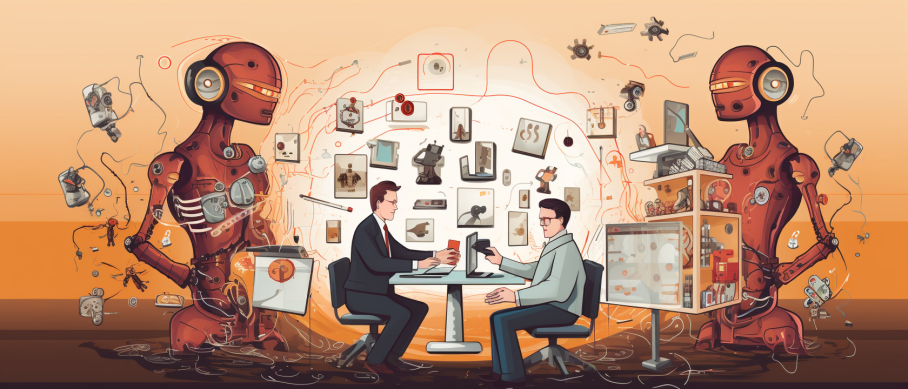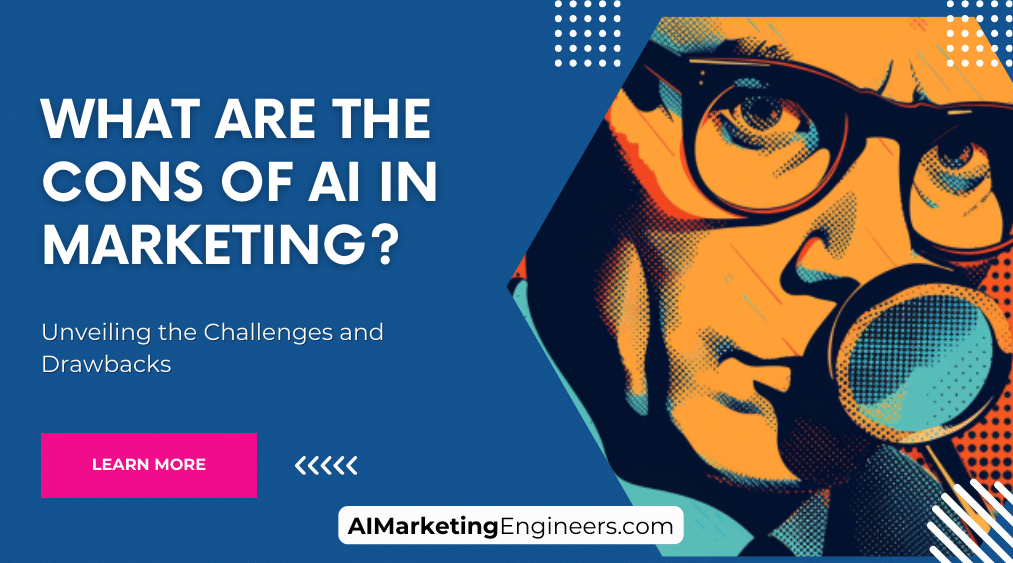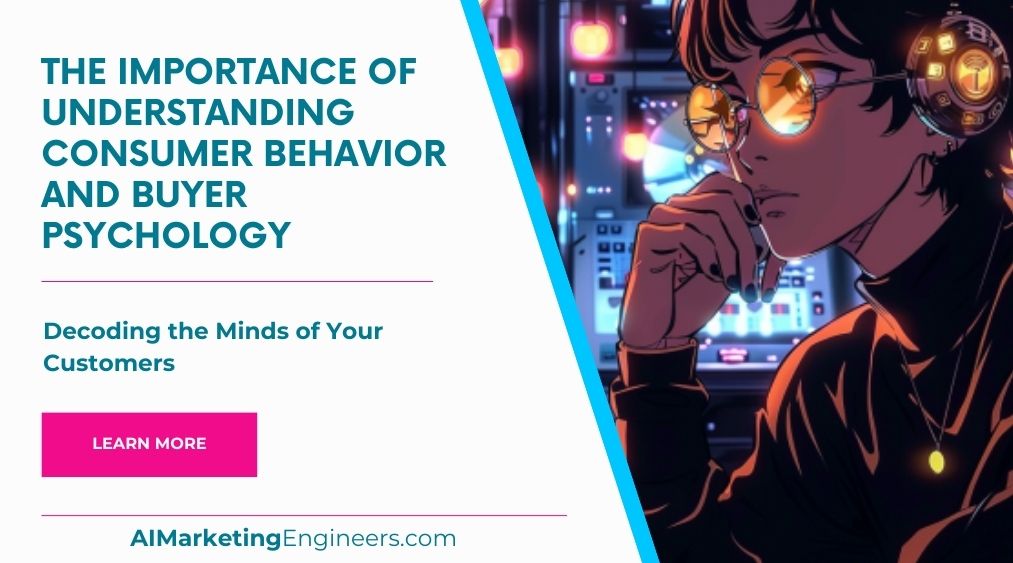Key Takeaways
✅ Awareness of Bias: Companies must ensure their AI systems are trained on diverse datasets to avoid the perpetuation of bias and discrimination, ensuring fairness and inclusivity in targeting and decision-making processes.
✅ Security and Privacy Measures: Implementing robust security protocols and respecting customer privacy is paramount to maintaining trust and preventing data misuse or breaches that could tarnish a company's reputation.
✅ Cost-Benefit Analysis: A thorough cost-benefit analysis is necessary to determine if the investment in AI aligns with a company's financial realities and long-term strategic goals, ensuring that the technology does not become a financial burden.
Introduction
Are you leveraging AI in your marketing strategy? Hold on a second—it's not all rocket fuel and smooth sailing! While Artificial Intelligence promises a new frontier of efficiency and precision in marketing, we must pause and consider the not-so-shiny flip side. In the land of algorithms and automated decision-making, lurking in the shadows are some real cons that could undermine your brand's reputation and your customer's trust.
Get ready to dive into the darker waters of AI in marketing, where bias, a lack of personal touch, and privacy pitfalls await. From the potential for discrimination to the real costs and limits of machine learning, join us as we unveil the crucial challenges you need to watch out for before letting AI take the wheel. Whether you’re a curious marketer or a concerned consumer, get the full download on the cons of AI in marketing that could change the way you think about this tech game-changer.

Bias and Discrimination
Artificial Intelligence (AI) systems can sometimes reinforce existing biases, as their learning processes are generally dependent on the data they're trained on. If this training data has underlying biases—such as overrepresentation of certain demographics—then the AI will likely adopt these biases. For instance, an AI trained predominantly on data related to male consumer behavior may inadvertently marginalize female perspectives. This not only affects the quality and fairness of marketing campaigns but can also result in discriminatory practices.
Furthermore, the expense of developing and deploying AI may be prohibitive, with smaller businesses or those lacking in resources failing to benefit from AI advancements, thereby potentially widening the gap between enterprises with varying capabilities.
Lack of Personal Touch
While AI can automate many tasks efficiently, it cannot replicate the nuanced, empathetic, and relational aspects of human interaction, which are vital in building customer relationships. In sectors where customer service and personalized experiences are key, such as hospitality or e-commerce, the absence of a human touch could compromise customer satisfaction. Additionally, as AI begins to automate tasks that were traditionally managed by humans, there is a legitimate concern regarding job displacement, potentially affecting the livelihoods of those whose roles may become redundant.

Security and Privacy Concerns
AI systems handle massive amounts of data, part of which is often personal and sensitive. With such large data handling, there comes an increased risk of privacy invasion and security breaches. If an AI system is not adequately secured, it can be vulnerable to hacking, misuse, or unintended distribution of personal information. Additionally, AI's drive to predict consumer behavior might lead to aggressive data collection practices, potentially infringing on consumers' rights to privacy and resulting in mistrust or backlash from consumers.
Dependence on Data Quality
The performance of AI in marketing is directly linked to the quality of data it processes. If the data is flawed, outdated, or incomplete, an AI's analysis and subsequent decisions can be inaccurate, leading to misguided strategies and potential revenue loss. As such, high data quality is imperative, but not always feasible, especially for small to mid-size organizations facing financial or technical constraints in obtaining and maintaining robust data sets.

Cost
While AI offers vast potential for enhancing marketing strategies and gaining insights, the costs associated with its implementation and upkeep can be substantial. This is not only in the context of initial investment but also concerning the ongoing operational expenses including maintenance, upgrades, and possibly additional hiring for specialized personnel to manage and interpret AI outputs. Furthermore, the risk of job displacement due to automation adds to the economic and social costs that need to be considered in the broader context of AI integration into marketing.
Limited Flexibility
AI systems operate within the boundaries set by their programmed algorithms and logic. This can lead to rigidity and reduced adaptability in dynamic market environments. AI might not be able to quickly respond to unforeseen events, such as shifts in consumer behavior due to a global crisis, or sudden changes in the market that necessitate rapid, creative thinking—a hallmark of human marketers. Additionally, perpetuating existing trends could prevent the discovery of innovative or disruptive marketing strategies, leading companies to miss out on new growth opportunities or alternative consumer segments that do not fit established patterns.

AI Marketing Engineers Recommendation
While Artificial Intelligence (AI) presents numerous opportunities for marketing innovation, enhancement of customer experiences, and personalization, there are also cons that should be taken into consideration. Here are some of the key drawbacks:
1. Loss of Human Touch: AI algorithms and data-driven marketing can sometimes lose the nuances of human interaction and empathy. A brand that depends too much on automation risks appearing impersonal and disconnected from its customers, which could hurt customer loyalty.
2. Ethical Concerns: The use of AI in marketing raises questions about privacy and data security. Marketers need to navigate complex issues regarding the ethical use of consumer data and ensure compliance with regulations such as the GDPR or CCPA.
3. Over-reliance on Technology: Leaning too heavily on AI can make a marketing team complacent and overly dependent on technology. Critical thinking and creative skills are still essential in marketing, and AI cannot replace those human attributes.
4. AI Bias: AI systems are only as good as the data they are trained on, and if that data is biased, the outcomes will be too. This can lead to non-inclusive or even discriminatory marketing practices that can harm a brand’s reputation.
5. Understanding Consumer Sentiment: AI can analyze data and recognize patterns, but understanding the emotional and psychological drivers behind consumer behavior is still a challenge for AI.

6. Complexity and Integration: Implementing AI requires a certain degree of technical sophistication and integration with existing systems. Many companies find the process complex, resource-intensive, and costly.
7. Job Displacement: The automation of tasks traditionally performed by humans can lead to job displacement. This not only affects morale within the company but can also contribute to a broader societal issue of unemployment.
8. Return on Investment (ROI) Uncertainty: For some businesses, especially small and medium-sized enterprises, the significant investment into AI marketing might not yield proportionate returns. The ROI can be uncertain and AI solutions can be costly to maintain and update.
9. Limited Creativity: AI might limit the creative process as it often focuses on optimizing and scaling existing strategies based on data patterns, potentially leading to a decline in truly innovative and out-of-the-box marketing campaigns.
10. Technical Glitches and System Failures: AI is not immune to technical problems, and a system breakdown can cause significant disruption to marketing operations, damaging campaigns and hurting customer trust.
While AI in marketing brings with it a host of advantages, it's crucial to balance these technological advancements with a human-centric approach. Marketers should be mindful about leveraging AI responsibly, addressing ethical concerns, and maintaining the human essence that connects customers to brands on a deeper level. Integrating AI should enhance, not replace, the intuitive and creative aspects of marketing that create genuine customer connections.

Conclusion
The use of artificial intelligence (AI) in marketing indeed presents an exciting frontier with the promise of increased efficiency and enhanced targeting accuracy. However, it's essential to critically examine the limitations and drawbacks that accompany this technology. From the potential perpetuation of bias and discrimination due to flawed training datasets to the intrinsic lack of the human touch that is often vital in customer relationship building, AI in marketing poses significant challenges.
Additionally, concerns surrounding security and privacy cannot be overlooked as the ramifications of data breaches or mishandling are consequential. The reliance of AI on high-quality data underscores the fact that its effectiveness is only as good as the data it processes, which can lead to misguided decisions if the data is subpar. Furthermore, the cost of implementation and maintenance of AI systems might be a barrier for many companies, with the increased expenses potentially outweighing the perceived benefits. Another critical point is the limited flexibility of AI, which can inhibit a company's ability to swiftly adapt to unforeseen market shifts or new trends.
In essence, while AI can undoubtedly transform marketing practices, it is imperative for businesses to tread carefully. It is crucial to acknowledge these cons and seek to address them proactively to harvest the advantages of AI without succumbing to its pitfalls.

FAQs
Question 1: What are some potential negative consequences of using AI in marketing?
Answer: Some potential negative consequences of using AI in marketing include data privacy concerns, fear of job displacement, limited creativity, and potential for bias. Using large amounts of data can cause privacy and security issues. AI's impact on jobs may lead to job loss in the industry. AI might not match human creativity, resulting in less innovative campaigns. Lastly, AI-trained on biased data could lead to discriminatory marketing practices.
Question 2: Why might some marketers be hesitant to adopt AI in their marketing strategies?
Answer: Marketers may hesitate to adopt AI due to concerns over data privacy, job displacement, creativity limitations, and potential biases. There may also be a lack of technical expertise or resources to effectively integrate AI into their marketing efforts.
Question: How can marketers mitigate the negative consequences of using AI in marketing?
Answer: To mitigate negative consequences, marketers can implement strong data privacy and security measures, invest in training and education for AI-related skills, ensure AI systems are transparent and accountable, and foster collaboration between human marketers and AI for more creative campaigns.







